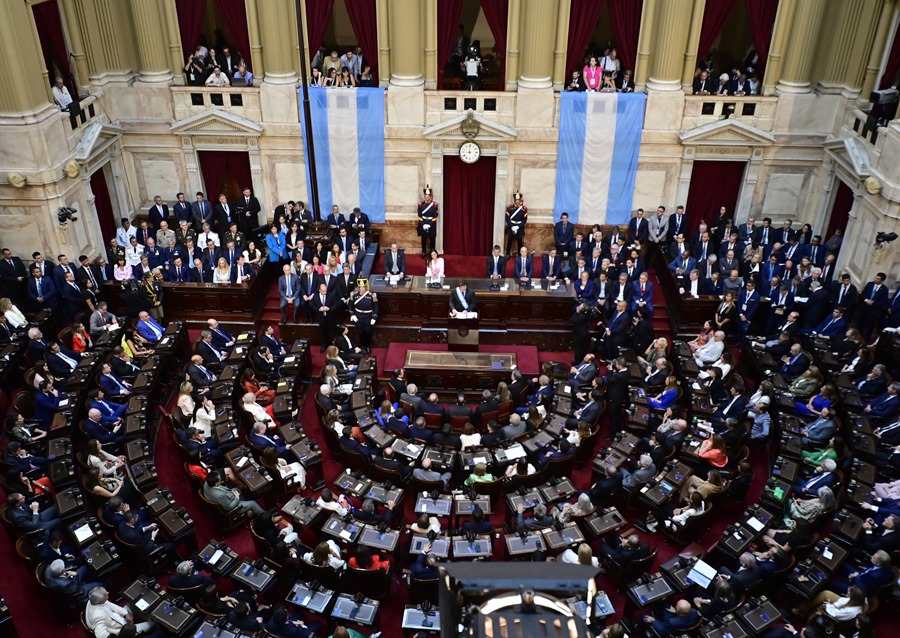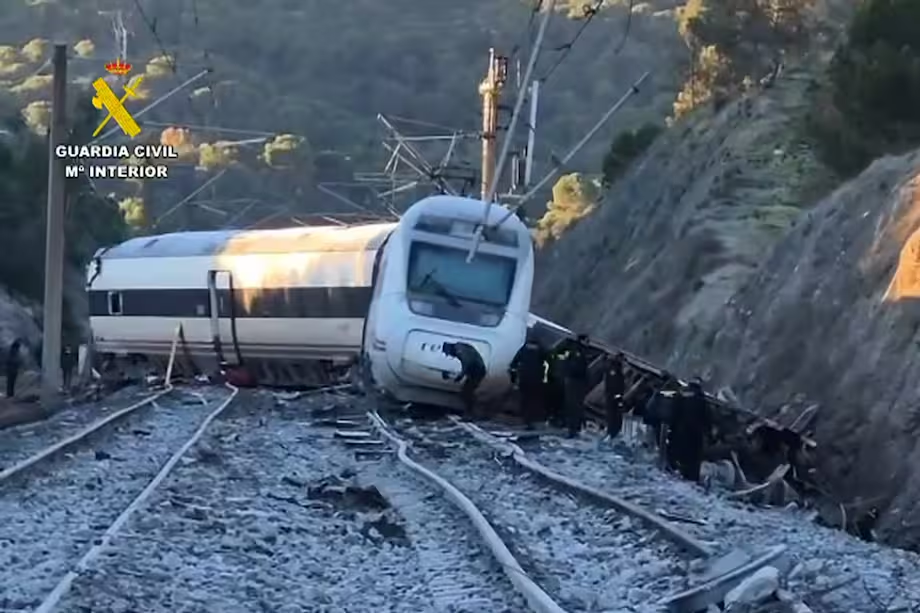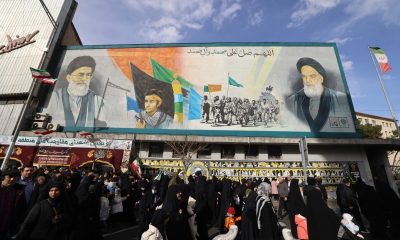International
Milei proposes may pact for opposition unity, promising firm leadership

Argentine President Javier Milei has called on the opposition to sign the ‘May Pact’, a new foundational document with 10 State policies, while offering his “conviction” in response to criticisms over potential governance issues during his administration.
In his inaugural address at the ordinary sessions of the National Congress, the president urged the 23 provinces and the Autonomous City of Buenos Aires to sign this document on May 25, the Day of the Motherland, in the city of Córdoba (central Argentina).
However, he explained that he will summon local governors to the Casa Rosada (Government headquarters) “to sign a pre-agreement and enact both the Basic Law (and Starting Points for the Freedom of Argentines) and a package of fiscal relief for the provinces” to then work “on a common project” and “begin a new era of glory” for Argentina.
Milei aims for consensus
Behind this dual proposal lies the recent standoff between the president and provincial governors over fiscal adjustment and cuts in funds that the State must send to the territories, which led to a call for “dialogue” and “respect” from local governors amid Milei’s frequent outbursts and disparaging messages towards them.
“If what they seek is conflict, they will have conflict because, unlike some of you who think about your next election, we only think about freedom,” said the libertarian president.
Milei asked that, despite differences, leaders can “prioritize the nation’s interests over electoral ones”.
Therefore, he called on governors and leaders of political parties to sign the ‘May Pact’ to “leave behind the antinomies of the past”, with 10 State policies for Argentina to abandon “the path of failure”.
Inviolability of private property; non-negotiable fiscal balance; reduction of public spending to around 25% of Gross Domestic Product (GDP); tax reform to reduce tax pressure; review of the co-participation scheme (State-provinces) “and end the current extortionate model” were the first points listed.
Milei invites all parties
Furthermore, the commitment of the provinces to advance in the exploitation of natural resources; a “modern” labor reform; a sustainable pension reform; structural political reform to modify the current system; and opening up international trade for Argentina “to be a protagonist in the global market”.
Milei said that all parties are invited because, as he claimed, neither he nor his party want to “play the mediocre game of politics”, but rather they emerged on the scene to “seriously change the country”.
In response to the potential governance issues often discussed concerning the lack of “parliamentary strength” of La Libertad Avanza (LLA, far-right), Milei countered with his “conviction”.
Thus, he claimed that his party “may not have the parliamentary strength or governors or mayors, but it knows what it has to do, how to do it, and has the conviction to do it”.
LLA is the third parliamentary minority, with 38 deputies and 7 senators, and does not have any governors, which obliges it to make agreements to advance legislative projects.
Télam News Agency to be shut down
Milei announced that his government will close the Télam public news agency.
In reviewing some achievements of his Executive in the 82 days since taking office on December 10, the libertarian highlighted the closure of the National Institute against Discrimination, Xenophobia, and Racism (INADI), which he described as “thought police”, which, he explained, “spent 2.8 billion pesos to maintain paid militants”.
“In this same vein, we are going to close the Télam agency,” the president announced without offering further details of the operation.
He also referred to the “immorality” of “spending money to buy the will of journalists” through official advertising in the media, which his Executive has suspended for a year, “in a country where people are starving”.
Founded in April 1945, the Argentine public news agency Télam had been in the libertarians’ sights since the electoral campaign, during which several leaders referred to its possible privatization or closure, as well as with the rest of the public media.
However, today the president only mentioned Télam.
Other media may be affected
On February 5, the Argentine government published in the Official Gazette the decree of intervention for one year of all state media as part of its policy of “reorganizing public companies”.
The Educ.ar portal, Radio Nacional, Televisión Pública, the Télam news agency, and the segmented Public Content channels (Encuentro, Paka Paka, Depor TV, ACUA Mayor, and ACUA Federal) were included in the list of media intervened for a year – with the option of extension – by Decree 117/2024.
Also included were the administration of the Audiovisual Production Center and the assets of the Argentine Universal Audiovisual Content Bank (Bacua).
According to the decree, the mission of the intervention was to “develop a plan for reformulation, readjustment, and action for the societies”, which will include reviewing fund management, modifying the contracting regime, and appointing or suspending officials.
The document named Diego Chaher and Diego Marías as intervenor and deputy intervenor, respectively, of Radio and Television Argentina and, ‘ad honorem’, of Télam, Public Contents, and Educ.ar. Both under the authority of the Chief of Cabinet of Ministers, Nicolás Posse.
“Populism took away 90% of our income”
In addition, the Argentine president denounced that populism took away a good part of the population’s income, when reviewing the “inheritance” received from the Administration of the Peronist Alberto Fernández (2019-2023).
“Populism took away 90% of our income to the point that a third of formal workers are poor,” said the president at the beginning of his speech before the Legislative Assembly, which serves as the start of its ordinary sessions and which offers, as he himself recalled, 82 days after the start of his administration, last December 10th.
International
Germany says football bodies alone will decide on possible World Cup boycott

The German Football Association (DFB) and FIFA will decide with full “autonomy” whether to boycott the upcoming World Cup, which will be hosted mainly by the United States in six months, following threats made by former U.S. president Donald Trump, the German government told AFP on Tuesday.
Trump has threatened to seize Greenland and impose higher tariffs on European countries that oppose the plan, raising political tensions between the United States and Europe.
“This assessment therefore lies with the relevant federations, in this case the DFB and FIFA. The federal government will respect that decision,” Sports State Secretary Christiane Schenderlein said in a statement emailed to AFP.
AFP had asked the German government about the possibility of a boycott of the World Cup to be jointly hosted by Canada, the United States and Mexico from June 11 to July 19.
“The federal government respects the autonomy of sport. Decisions regarding participation in major sporting events or possible boycotts fall exclusively within the responsibility of the relevant sports federations, not the political sphere,” said Schenderlein, a member of the conservative CDU, the party of Chancellor Friedrich Merz.
International
Daily Mail publisher insists reports relied on legitimate sources amid privacy trial

Two British tabloids accused of phone hacking and other forms of “unlawful information gathering” against Prince Harry and six other individuals, including singer Elton John, insisted on Tuesday that their reporting relied on legitimate sources.
Associated Newspapers Ltd (ANL), the publisher of the Daily Mail and The Mail on Sunday, sought to rebut allegations of privacy violations through illegal methods on the second day of trial at London’s High Court, following a lawsuit filed by the seven claimants.
Prince Harry, 41, who attended court hearings on both Monday and Tuesday, could be called to testify starting Wednesday in a trial expected to last up to nine weeks.
Lawyers for the claimants said the alleged illegal activities took place between 1993 and 2011, with some incidents reportedly extending as late as 2018. They argue that the tabloids hired private investigators to intercept phone calls and obtain confidential information, including detailed phone records, medical histories, and bank statements.
However, Anthony White, counsel for ANL, told the court that the trial would show the company presents “a compelling account of a pattern of lawful source acquisition” for its articles.
White added that the claims would require the court to believe that journalists and staff at the tabloids had engaged in widespread dishonesty, which the company strongly denies.
International
Death toll from southern Spain train crash rises to 40

The death toll from the train accident that occurred on Sunday in southern Spain has risen to 40, according to investigative sources cited by EFE on Monday afternoon.
Since early Monday, search operations have focused on the damaged carriages of a Renfe train bound for Huelva, which collided with the last derailed cars of an Iryo train traveling from Málaga to Madrid after it left the tracks.
The crash has also left more than 150 people injured. Of these, 41 remain hospitalized, including 12 in intensive care units at hospitals across the Andalusia region.
More than 220 Civil Guard officers are working at the site, searching the railway line and surrounding areas for key evidence to help identify victims and determine the causes of the accident.
The tragedy has revived memories of the deadliest railway disasters in Europe in recent decades. In Spain, the most severe occurred on July 24, 2013, when an Alvia train derailed near Santiago de Compostela, killing 80 people and injuring 130 others.
At the European level, the worst rail disaster took place on June 3, 1998, in Eschede, northern Germany, when a high-speed train struck a bridge pillar at 200 kilometers per hour, resulting in 98 deaths and 120 injuries.
-

 International4 days ago
International4 days agoU.S. deportation flight returns venezuelans to Caracas after Maduro’s ouster
-

 Central America3 days ago
Central America3 days agoGuatemala prison uprisings leave 46 guards held by gangs
-

 International1 day ago
International1 day agoDeath toll from southern Spain train crash rises to 40
-

 International4 days ago
International4 days agoCanada accuses Iran of killing its citizen during anti-government unrest
-

 Central America1 day ago
Central America1 day agoGuatemala raises police death toll to nine after gang violence escalates
-

 International4 days ago
International4 days agoSheinbaum highlights anti-drug gains after U.S. says challenges remain
-

 International1 day ago
International1 day agoOver 160 christian worshippers kidnapped in Kaduna Church attacks
-

 International3 days ago
International3 days agoChile declares state of catastrophe as wildfires rage in Ñuble and Biobío
-

 International4 days ago
International4 days agoFormer South Korean President Yoon sentenced to five years in prison
-

 International12 hours ago
International12 hours agoGermany says football bodies alone will decide on possible World Cup boycott
-

 International1 day ago
International1 day agoSpain’s Prime Minister pledges transparency after train crash kills at least 39
-

 International12 hours ago
International12 hours agoDaily Mail publisher insists reports relied on legitimate sources amid privacy trial


























